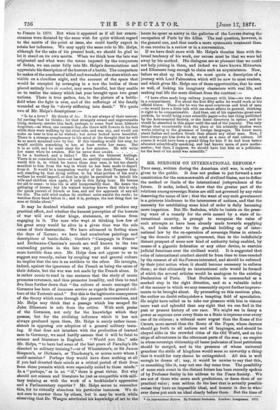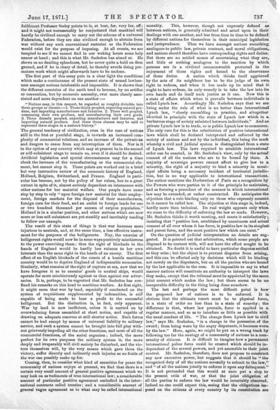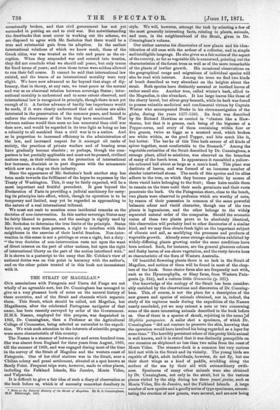MR. SEEBOHM ON INTERNATIONAL REFORM.* Tills essay, written during the
American civil war, is only now given to the public. It does not profess to put forward a new constitution for the commonwealth of civilized States, nor to define the method or limits of the international jurisprudence of the future. It seeks, indeed, to show that the greater part of the' relations among sovereign States are still not governed by any rules deserving the name of law ; that the want of any such government is a grievous hindrance to the intercourse of nations, and that the. necessity for establishing some kind of order is daily becoming- more imperious. But Mr. Seebohm, while he insists on the press- ing want of a remedy for the evils caused by a state of in- ternational anarchy, is prompt to recognize the value of such attempts as have been already made towards supplying, it, and looks rather to the gradual building up of inter- national law by the co-operation of sovereign States in extend- ing the domain of positive agreement, than to the indefinitely distant prospect of some new kind of authority being enabled, by means of a gigantic federation or any other device, to exercise judicial functions over the civilized world. It is suggested that rules of international conduct should be from time to time enacted by the consent of all the Powers interested, and should be enforced by their joint action when it should become necessary to enforce them ; so that ultimately an international code would be formed' of which the several articles would be analogous to the existing Declaration of Paris. That Declaration is commended as a marked step in the right direction, and as a valuable index of the manner in which we may reasonably expect further improve- ments to be brought about. By proceeding on this cautious plan, the author no doubt relinquishes a tempting field of speculation. He might have called us to take our pleasure with him in visions more vast and splendid than any sight that we can find in the- past or present history of our race. We might see in fancy a power as supreme over every State as a State is supreme over every- one of its citizens ; a tribunal more august than the Rome of the- Caesars, more sacred than the Rome of the Popes, whose decrees should go forth to all nations and all languages, and should be' obeyed alike in the crowded cities of the Old World, and on the' ships of adventurers in the uttermost parts of the seas ; an empire in whose sovereign citizenship all lesser jealousies of local patriotism should be merged, and in the presence of whose universal grandeur the strife of kingdoms would seem so unworthy a thing- that it would for very shame be extinguished. All this is well enough to dream of ; nay, it would be unwise to say that this, or something like it, may not one day come true. The possibility of some such event in the distant future has been recently spoken- of by Professor Seeley in his address to the Peace Society. We are not of those who scorn such predictions, or deem them of no practical value ; men seldom do the best that is actually possible. unless they have an impossible ideal, and honour is due to who- ever dares put such an ideal clearly before them. But the time of * International Reform. By Frederic Seebohm. London: Longmans.
fulfilment Professor Seeley points to is, at best, far, very far, off ; and it might not unreasonably be conjectured that mankind will hardly be civilized enough to carry out the scheme of a universal Federation, before they are also civilized enough to abstain from war without any such conventional restraint as the Federation would exist for the purpose of imposing. At all events, we are tempted to see if we cannot find in our waking hours some help nearer at hand ; and this is what Mr. Seebohm has aimed at. He shows us no dazzling splendours, but he never quits a hold on firm ground, and if he is chary of detail, he thereby avoids doing pre- mature work which might afterwards have to be undone.
The first part of this essay puts in a clear light the conditions which make a continuance of the present state of armed lawless- ness amongst nations intolerable and impossible. It is shown that the different countries of the earth tend to become, by no artifice or convention, but by economic necessity, ever more closely asso- ciated and more dependent on one another :—
" Nations may, in this respect, be regarded as roughly divisible into three groups or classes :-1. Those thinly peopled, exporting natural pro- duce, and importing manufactures and luxuries. 2. Those well peopled, consuming their own produce, and manufacturing their own goods. 3. Those densely peopled, exporting manufactures and luxuries, and importing natural produce. And these three classes may be said to represent three stages in a nation's history."
The general tendency of civilization, even in the case of nations still in the first or youthful stage, is towards an increased com- plexity of commercial relations, and an increase of the privaticns and dangers to ensue from any interruption of them. Nor is it in the option of any country which may at present be in the second or self-subsistent stage to remain so, even if it should be desired.
Artificial legislation and special circumstances may for a time check the increase of the 'manufacturing or the commercial ele- ment, but cannot stop it. These points are worked out in a brief but very instructive review of the economic history of England, Holland, Belgium, Switzerland, and France. England in parti- cular has become, not by the policy of her rulers, but to a great extent in spite of it, almost entirely dependent on intercourse with other nations for her material welfare. Our people have come step by step to rely "upon foreign raw material for their employ- ment, foreign markets for the disposal of their manufactures, foreign corn for their food, and an outlet to foreign lands for one or two hundred thousand per annum of surplus population." Holland is in a similar position, and other nations which are now more or less self-subsistent are yet steadily and inevitably tending to follow our example.
The result of this state of things is that war becomes more injurious to neutrals, and, at the same time, a less effective instru- ment for the purposes of the belligerents. Nay, the exercise of belligerent rights would now be in some ways positively mischievous to the power exercising them ; thus the right of blockade in the hands of England would be hardly less ruinous to her own interests than the same right in the hands of an enemy. The first effect of an English blockade of the coasts of a hostile maritime country would be to deprive England of indispensable necessaries.
Similarly, what remains of the right of capture at sea, now that we have foregone it as to enemies' goods in neutral ships, would operate far more mischievously against us than against our adver- saries. It is, perhaps, to be regretted that Mr. Seebohm has con- fined his remarks on this head to maritime warfare. At first sight, it might seem that war by land, especially if conducted on the system of requisitions supplemented by indemnities, is still capable of being made to bear a profit to the successful belligerent. But the distinction is, in fact, only apparent.
War by land is now inefficient, unless it is carried on by overwhelming forces assembled at short notice, and capable of drawing on adequate reserves at still shorter notice. Such forces cannot be had except by means of universal liability to military service, and such a system cannot be brought into full play with- out grievously impeding all the other functions, and most of all the commercial functions, of the social organism; indeed, the more perfect for its own purposes the military system is, the more deeply and irreparably will civil society be disturbed, and the vic- tors themselves will, by the very means which gave them the victory, suffer directly and indirectly such injuries as no fruits of the war can possibly make up for.
Coining, then, to consider what kind of securities for peace the community of nations enjoys at present, we find that there is a certain very small amount of general positive agreement which we may look on as udiments of true international law; a considerable amount of particular positive agreement embodied in the inter- national contracts called treaties ; and a considerable amount of general vague agreement as to what may be called international morality. This, however, though not expressly defined as between nations, is generally admitted and acted upon in their dealings with one another, and has from time to time to be defined by different nations for themselves in their municipal legislation and jurisprudence. Thus we have amongst nations something, analogous to public law, private contract, and moral obligations,. and nations should therefore have corresponding rights and duties. But there are no settled means of ascertaining what they are,. and little or nothing analogous to the sanction by which. persons are in a civilized commonwealth protected in the enjoyment of those rights and bound to the observance of those duties. A nation which thinks itself aggrieved: by the acts of its neighbour has to be the judge of its owm right to redress, and when it has made up its mind that it ought to have redress, its only remedy is to take the law into its. own hands and do itself such justice as it can. Now this is a state of affairs which when it prevails between individuals is. called Lynch law. Accordingly Mr. Se.ebohin says that we are living under the rule of what is no better than international Lynch law, "closely resembling in practice, and altogether identical in principle with the state of Lynch law which in a. barbarous stage of society subsisted between individuals." And as private Lynch law is to trade, so is public Lynch law to commerce. The only cure for this is the substitution of positive international laws which shall be declared interpreted and enforced by the society of nations and not by the individual, this being the mark whereby a civil and judicial system is distinguished from a state of Lynch law. The laws required to establish international order can be enacted, in Mr. Seebohtn's view, only by the actual consent of all the nations who are to be bound by them. A majority of sovereign powers cannot affect to give law to a minority, the right of a majority to bind a minority in muni- cipal affairs being a necessary incident of territorial jurisdic- tion, but in no way applicable to international transactions.. The author mentions the Declaration of Paris as a recognition by the Powers who were parties to it of the principle he maintains,. and as forming a precedent of the manner in which international law may be extended, or rather constructed. He anticipates the objection that a rule binding only on those who expressly consent. to it cannot be called law. The objection at this stage is, indeed, hardly more than technical. Its real weight appears only when. we come to the difficulty of enforcing the law so made. However, Mr. Seebohm thinks it worth meeting, and meets it satisfactorily;. insisting that "positive law, established by unanimous and actual consent of all over whom it has force, is positive law in its simplest and purest form, and the most positive law which can exist."
On the question of judicial interpretation no details are sug- gested. It is pointed out that arbitration, which some people are disposed to be content with, will not have the effect sought to be obtained. No doubt it is useful to have particular disputes settled as they arise ; but the object is to prevent disputes from arising, and this can be effected only by decisions which will be binding not merely on the disputants, but on all the parties who are bound by the law applicable to the case. It is impossible to say in what manner nations will constitute an authority to interpret the laws they make, except that the tribunal must be appointed by the same joint consent which makes the law ; but there seems to be no insuperable difficulty in the thing being done somehow.
The last and perhaps the most difficult point is how. the proposed law of nations is to be enforced. It is. obvious that the ultimate resort must be to physical force, in a state of order no less than in a state of anarchy ; the difference is that, where law prevails, force is applied in a. regular manner, and so as to interfere as little as possible with the usual conduct of life. "The change from Lynch law to civil law," says Mr. Seebohm, "is a change in the possession of the sword ; from being worn by the angry disputants, it becomes worn. by the law." Here, again, we might be put on a wrong track by following too far the analogy of a community of nations to a com- munity of citizens. It is difficult to imagine how a permanent international police force could be created which should be in- dependent of the several powers, and yet amenable to their joint control. Mr. Seebohm, therefore, does not propose to construct any new executive power, but suggests that it should be "the recognized duty of all the nations severally to submit to the law," and "of all the nations jointly to enforce it upon any delinquent." It is not pretended that this would at once put a stop to the present evils of war, or that the joint obligation of all the parties to enforce the law would be invariably observed. Indeed no one could expect this, seeing that the obligations im- posed on the citizens of every country by its constitution are
occasionally broken, and that civil government has not yet succeeded in putting an end to civil war. But notwithstanding the drawbacks that must occur in working out the scheme, we are disposed to agree with Mr. Seebohm that there would be a true and substantial gain from its adoption. In the earliest international relations of which we know much, those of the Greek cities, war was treated as the rule and peace as the ex- ception. When they suspended war and entered into treaties, they did not conclude what we should call peace, but only truces for fixed terms of years; and even those terms were seldom allowed to run their full course. It cannot be said that international law existed, and the traces of an international morality were very slight. We have now advanced so far beyond that stage of dip- lomacy, that in theory, at any rate, we treat peace as the normal and war as an abnormal relation between sovereign States ; inter- national morality is understood and to some extent observed, and international law is recognized in principle, though there is not yet enough of it. A further advance of hardly less importance would be made, if it were clearly understood that all nations are alike interested in the preservation of the common peace, and bound to enforce the observance of the laws they have sanctioned. War between nations would then seem no less unnatural than civil war does now, and would be regarded in its true light as being no less a calamity to all mankind than a civil war is to a nation. And as in proportion to increased efficiency in the administration of the law, and increased respect for it amongst all ranks of society, the practices of private warfare and of bearing arms have gradually become obsolete ; so perhaps, though the com- parison is but partially applicable and must not be pressed, civilized nations may, as their reliance on the protection of international law increases, diminish or in part dispense with the armaments which now are a clog on their industry.
Since the appearance of Mr. Seebohm's book another step has been made towards the fulfilment of the hopes he expresses by the Treaty of Washington. This, it may be fairly expected, will be a most important and fruitful precedent. It goes beyond the Declaration of Paris in providing a judicial machinery for carry- ing its principles into effect, which, though its operation is to be temporary and limited, may yet be regarded as approaching to the nature of a real international tribunal.
We must not omit to mention some incidental remarks on the doctrine of non-intervention. In this matter sovereign States may be fairly likened to persons, and the analogy is rightly used by Mr. Seebohm to determine the true limits of the principle. States have not, any more than persons, a right to interfere with their neighbours in the exercise of their lawful freedom. Non-inter- vention in this sense is not a privilege or even a right, but a duty : 4' the true doctrine of non-intervention rests not upon the want of direct interest on the part of other nations, but upon the right of international liberty on the part of the nation interfered with." It is shown in a postscript to the essay that Mr. Cobden's view of national duties was on this point in harmony with the author's, and on the other points treated of in this book not inconsistent with it.




































 Previous page
Previous page